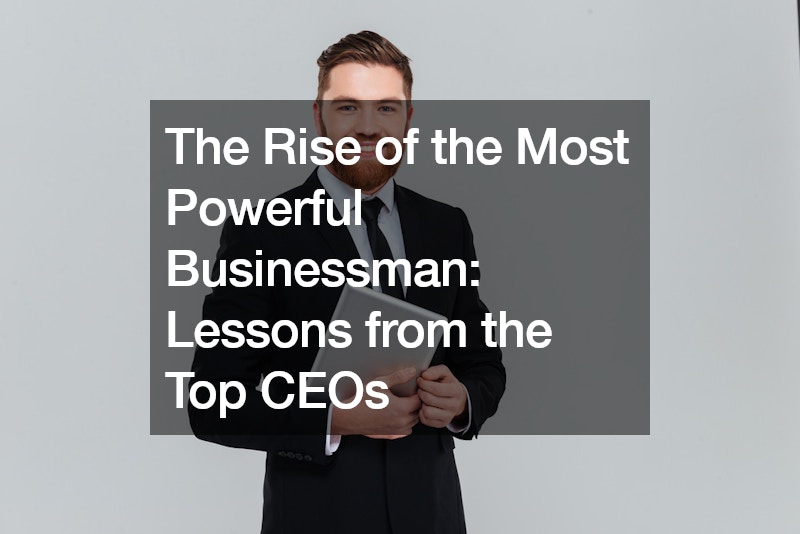In the dynamic and ever-evolving landscape of global business, the journey to becoming the most powerful businessman is marked by a blend of strategic insight, innovation, and unwavering determination. The world’s top CEOs exemplify these traits, setting benchmarks and inspiring a new generation of leaders. This article delves into the key lessons from these influential figures, offering insights into their paths to success and the qualities that define their leadership.
Vision and Strategic Thinking
A hallmark of the most powerful businessman is a clear and compelling vision.
Visionaries like Elon Musk, CEO of Tesla and SpaceX, have transformed entire industries through their forward-thinking approach. Musk’s vision of a sustainable future and space exploration has not only disrupted the automotive and aerospace sectors but also inspired global shifts towards renewable energy and space travel.
Strategic thinking is equally crucial. Jeff Bezos, founder and former CEO of Amazon, exemplified this by continuously expanding Amazon’s horizons—from an online bookstore to a global e-commerce giant, cloud computing leader, and media powerhouse. His ability to foresee market trends and adapt accordingly has solidified Amazon’s position as a dominant force in multiple industries.
Innovation and Adaptability
Innovation is at the core of the success of the most powerful businessmen. Steve Jobs, co-founder and former CEO of Apple, is celebrated for his relentless pursuit of innovation. His introduction of the iPhone revolutionized the tech industry, setting new standards for smartphones and digital ecosystems. Jobs’ ability to think outside the box and push the boundaries of technology underscored the importance of innovation in achieving business success.
Adaptability is another critical trait. Satya Nadella, CEO of Microsoft, transformed the company by embracing cloud computing and AI. Under his leadership, Microsoft shifted from a software-centric model to a cloud-first, mobile-first strategy. Nadella’s willingness to pivot and adapt to changing market dynamics has been instrumental in revitalizing Microsoft’s growth and relevance in the tech industry.
Resilience and Perseverance
The journey to becoming the most powerful businessman is fraught with challenges. Resilience and perseverance are essential qualities that enable leaders to navigate through adversity. Warren Buffett, CEO of Berkshire Hathaway, is a testament to the power of long-term thinking and resilience. Despite economic downturns and market fluctuations, Buffett’s disciplined investment approach and unwavering focus on value creation have yielded remarkable success.
Another example is Jack Ma, co-founder and former executive chairman of Alibaba Group. Ma faced numerous rejections and setbacks in his early career, including being turned down for jobs and facing skepticism about his business ideas. However, his perseverance paid off as he built Alibaba into one of the world’s largest e-commerce and technology conglomerates.
Empathy and People-Centric Leadership
Empathy and people-centric leadership are often overlooked but are crucial to sustainable success. Indra Nooyi, former CEO of PepsiCo, is renowned for her empathetic leadership style. She prioritized employee well-being, diversity, and inclusion, fostering a culture of respect and collaboration. Nooyi’s approach not only enhanced employee satisfaction but also drove business performance and innovation.
Richard Branson, founder of the Virgin Group, is another advocate of people-centric leadership. His emphasis on employee happiness and customer satisfaction has been integral to the Virgin brand’s success. Branson’s belief that happy employees lead to happy customers underscores the importance of empathy and a people-first approach in business.
Ethical Leadership and Integrity
Ethical leadership and integrity are foundational to the legacy of the most powerful businessmen. Tim Cook, CEO of Apple, has been a vocal advocate for privacy, sustainability, and human rights. Cook’s commitment to ethical practices and transparency has reinforced Apple’s reputation as a socially responsible company.
Similarly, Howard Schultz, former CEO of Starbucks, championed ethical sourcing, community engagement, and employee benefits. His efforts to create a positive social impact through business practices have set a benchmark for corporate responsibility.
Continuous Learning and Growth Mindset
A growth mindset and a commitment to continuous learning are vital for staying relevant and competitive. Bill Gates, co-founder of Microsoft, is a lifelong learner who continually seeks knowledge and embraces new ideas. His philanthropic efforts through the Bill & Melinda Gates Foundation reflect his belief in using knowledge and resources to address global challenges.
Mark Zuckerberg, CEO of Meta (formerly Facebook), embodies a growth mindset by constantly iterating and evolving the company’s products and services. His willingness to take risks and learn from failures has been crucial to Meta’s dominance in the social media landscape.
Conclusion
The rise of the most powerful businessman is a multifaceted journey that requires a combination of vision, innovation, resilience, empathy, ethical leadership, and a growth mindset. The top CEOs of today offer invaluable lessons through their experiences and achievements. By embracing these qualities and learning from their stories, aspiring business leaders can navigate the complexities of the corporate world and make a meaningful impact in their respective fields. The journey to becoming the most powerful businessman is not just about achieving personal success but also about inspiring and empowering others to reach their full potential.
.


